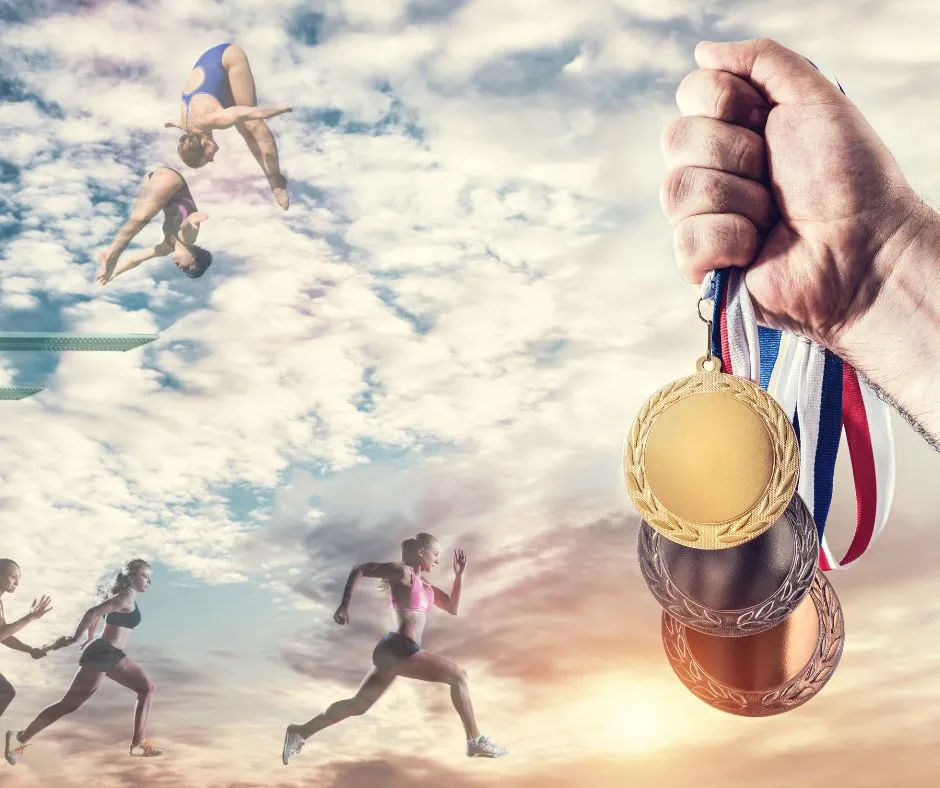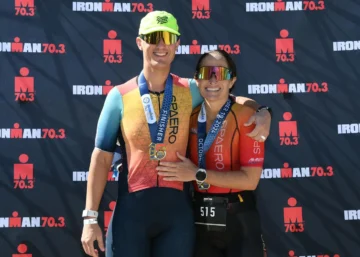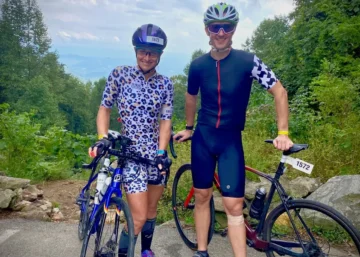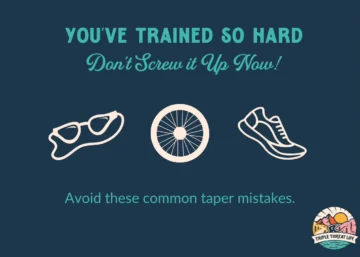
With the 2024 Summer Olympics set to kick off in just two weeks, the world is all abuzz with Paris-themed excitement. In our household, we’re most excited to watch Swimming, Track & Field, Diving, Gymnastics, and of course Triathlon.
(Or Duathlon if they can’t get the Seine River cleaned up in time…)
While watching the US Olympic Trials, it was hard not to feel awestruck by the display of insane athletic ability, pure talent, and competitive mastery that these athletes bring to the table.
They’re so strong, so fast, and so dynamic. It’s like they aren’t even human.
But of course they are, and the truth is they’re more like us than you probably know.
The Mental Links to Excellence- 5 Skills
A striking result of the study was that of three readiness factors- mental, physical, and technical- only one showed a statistically significant link to final Olympic ranking.
Can you guess which it was? Not physical readiness.
It was mental readiness.
Another key insight was the existence of certain “success elements” seen in virtually all of the best performers across all sports.
Not all Olympians. The best performing Olympians. There was a large percentage of athletes in 84’ who trained to do well at the Games, and wanted to do well, but didn’t perform to their potential.
The 5 success elements seen among successful Olympians included: quality training, clear daily goals, imagery training, simulation training, and mental preparation.
1.Quality Training– These world-class athletes had discovered that the best way to establish the patterns they wanted to draw upon in competition was to train with a focus on quality. It’s something we hear a lot in triathlon- quality over quantity.
Certainly, you need both quality and quantity to achieve success, but it’s easy to get caught up in just checking off the box. Completing a task with the least amount of effort. Phoning it in.
Elite athletes don’t do that. These Olympians mentally prepared for training by thinking about what they wanted to accomplish the night before, morning of, and on the way to training.
When was the last time you did that on the way to work?
“If I’m going to take the energy to go out on the floor and do a routine, it’s got to count. I’d be better off to go out and do 4 perfect routines than to do 20 that are just mediocre. It’s quality, not quantity… Once I decide to do my routine, I set the mood exactly, as closely as it could be to competition.- Highly successful Olympic rhythmic gymnast
2.Clear Daily Goals– The best athletes had clear daily goals. They had a vision for what they wanted to accomplish each day, during every training session, and they had a plan for how they would achieve that goal.
Not all goals have to be large and impressive like winning a gold medal at the Olympics. Daily goals are smaller, and often more specific, but no less important.
For example, focusing on your catch during a swim set, increasing your power during a hard bike interval, or running with forward lean and quick cadence. It might also look like investing in marketing for your business or taking a course to learn a new skill.
“My coach wrote up every single one of my dives on a piece of paper, all the bad things about my dives and all the good things about my dives. I read his corrections every day, before every workout. I set a goal to change something on that piece of paper every day. For me, the dive is good, but there’s always something to improve.”- Highly successful Olympian- springboard diver
3. Imagery Training- The most successful Olympians used imagery to perfect skills, make corrections, and imagine themselves being successful in competition. They envisioned each step of the process that would lead them toward achieving their ultimate goal.
These athletes used imagery on average for 12 minutes, once a day, 4 days a week. For men, the quality of their mental imagery was directly related to performance in terms of their Olympic percentile rank. For women, doing outcome success imagery throughout year before the Olympics and spending time in preplanned systematic competition imagery helped them feel more prepared, but wasn’t necessarily associated with competition outcome.
“At night before going to sleep, I did my dives. Ten Dives. I started with a front dive, the first one I had to do at the Olympics and I did everything as if I was actually there. I saw myself on the board with the same bathing suit. Everything was the same. If the dive was wrong, I went back and started over again. – Highly successful Olympian- springboard diver
But these athletes weren’t born with this ability. They perfected their mental skills through consistent daily practice. They developed refined performance imagery, which is kind of like an inside view where the athletes feel like they’re actually doing a skill.
4.Simulation Training– The best athletes approached their training sessions as if they were at the actual competition. They often wore the same outfit they would wear at the Olympics.
We do this exact same thing when preparing for a big race. We do a complete test run with all the gear we plan to use (goggles, wetsuit, kit, shoes, helmet). We practice our nutrition plan (carb drink, gels, sodium). We make sure all our equipment is working properly (Di2 batteries charged, cadence and power synced to bike computer, tire change kit fully stocked).
Whether you believe it or not, you’re always preparing for something. You either prepare to succeed or you prepare to fail. It’s your choice.
5.Mental Preparation– This is the big one. The best athletes had a robust mental preparation plan that included a pre-competition plan, competition focus plan, competitive evaluation, and plan for dealing with distractions.
Mental readiness, in terms of focus and feelings prior to, and during competition, was a significant predictor of final Olympic ranking. For men, mental preparation immediately prior to the competition was the best and only predictor. For females, competitive focus during the event was the most telling.
A- Pre-competition plan- Athletes used mental imagery while warming up, as well as positive thoughts and reminders about what worked well in previous competitions.
B- Competition focus plan- In most cases, the athletes who had the best focus relied on a plan that connected them to their “job.” On the other hand, those with the worst focus dwelled on factors they had no control over, like the final outcome, other competitors, and distractions.
“We have a start plan, and in it I concentrate only on the first few strokes… Then I concentrate on the next little bit of the race… Then it’s getting to the end, we really have to push… Crossing the line, the thing I remember was letting the emotions go and being able to say, ‘That’s it. It’s over.’ I just knew that we’d gone our very hardest.” – Highly successful Olympian- pairs kayak
C. Competitive evaluation– The best athletes recorded accounts of their training and performances in training logs or diaries. They analyzed their efforts and extracted important lessons and key things to work on.
If a race went great, they thought about the mental factors they used to achieve that performance. If a competition didn’t go well, they tried to determine what might have gone wrong in their mental state, before or during an event.
“By analyzing my race, stroke for stroke, figuring out what I did wrong, I can put together a more perfect race. Thie idea is you try and recall exactly what happened in the race and gain from it.”- Highly successful Olympian- canoeing
Check out this post about how, and why, you should write a race report.
During the 1984 Olympic Games, the athletes who had most of the 5 success elements (quality training, clear daily goals, imagery training, simulation training, and mental preparation) had the best performances. In contrast, those who had fewer of the success elements performed below what was realistically expected of them.
“Many of the athletes we interviewed did not perform to potential at the Olympic Games despite the fact that some had a very strong track record. They were expected to do well, and wanted to do well, but fell far short of the mark.”
The bottom line is that the athletes who didn’t perform to their capability at the Olympics had trained well physically, but hadn’t prepared well enough for the mental hurdles they would face.
While most of us don’t have the strength, speed, or stamina of an Olympian, developing mental skills is something we can do to become the best version of ourselves- whether it’s in sports, business, or life.
We live in a world full of extremely talented, smart, hard working people. What’s going to set you apart from the rest? Give you the extra edge?
If you’ve retained any of what you’ve just read, then you know what the answer is.


